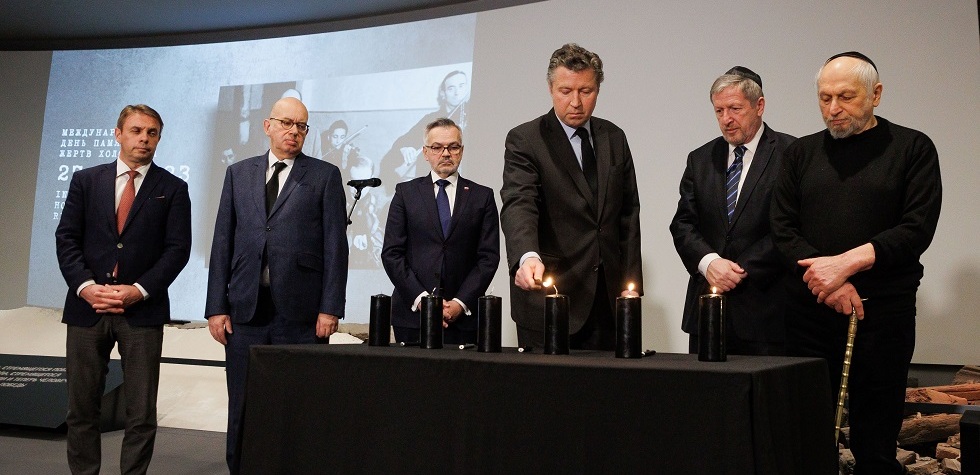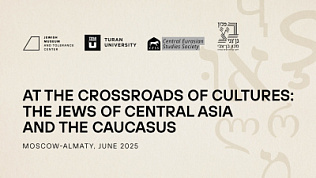Jewish Museum and Tolerance Center hosts ceremony marking the International Holocaust Remembrance Day
On January 27, the Jewish Museum and Tolerance Center hosted an annual ceremony to commemorate the International Day in Memory of the Victims of the Holocaust. Foreign ambassadors, government officials, religious leaders, and public figures attended the ceremony to pay homage to those who perished at Nazi concentration camps.
Chief Rabbi of Russia Berel Lazar said that “on this day, we remember the tragic events, the most terrible chapters in the history of the 20th century. We remember the most horrendous tragedy that the Jewish people have ever endured. Indeed, these events took place a long time ago, and there are but a few witnesses of the Holocaust who have lived to this day. But we must never forget what happened back then. It is a duty we owe to the millions of victims of Nazism. It is a duty we owe to the soldiers who liberated the world and saved it from slavery and our people, from total obliteration. And it is our sacred duty to make sure that future generations should never experience anything of this kind. Today, on the Holocaust Remembrance Day, we ask and pray for peace. It is our number one wish that all people should live in brotherhood, mutual understanding, friendship and respect for each other.”
This year, the Jewish Museum and Tolerance Center and the Embassy of the Federal Republic of Germany in the Russian Federation organised a concert dedicated to the memory of the victims of the Holocaust. For the first time ever, the solemn ceremony featured pieces composed by the likes of Dmitry Shostakovich, Zikmund Schul, Gideon Klein, Viktor Ullmann, Hans Neumeyer, Leo Smit, and Mieczysław Weinberg and performed by winners of international music competitions such as Maria Krestinskaya (violin), Andrey Berezin (cello), Evgeny Starodubtsev (piano), Anton Prischepa (piano, clarinet), Andrey Zaytsev (recorder, clarinet), and PetRo Duo (piano). The concert was hosted by Oleg Lipovetsky, the artistic director of the Shalom Moscow Jewish Theatre. The musical numbers were accompanied by archival footage featuring episodes of the pre-war life of the Jewish people, the documentary evidence of the horrible hardships endured by prisoners in concentration camps and ghettos, as well as photographs of their liberation and those dedicated to their memory.
President of the Federation of Jewish Communities of Russia Rabbi Alexander Boroda said: “The word ‘Holocaust’, even outside of any context, begets many associations. As symbols of fear and inhuman cruelty, they are shared by all of us in their emotional tone, but in their embodiment, they can be very different. The infinite volume of this word causes us to sense our own heartache, but it does not transmit the literal experience of others. Although the evidence of the Holocaust exists in multitudes as documents, photographs, and films, the experiences of its witnesses and victims will go away along with them. And that is an irreparable historical and cultural loss for the generations of the present and future. It is for this reason that we decided to put together a concert of music written by composers imprisoned and killed during the Holocaust or affected by it. Music is indeed elevated above all other arts in its ability to convey the state of one’s soul. It speaks to us in the language of feelings, which means that the works of the composers who are to be commemorated in today’s programme are manifestations of their fates. And it is up to us to remember and preserve them. Maintained within the notes, the pain of those, whose lives ended in the Holocaust, will sound for all of us today on a deeply personal level, and will, as such, remain in our souls.”
The rabbi also thanked the Embassy of the Federal Republic of Germany for accepting the invitation to become a partner in the event and helping organise the programme.
German Ambassador to Russia Dr Géza Andreas von Geyr said: “The Holocaust was a singular rupture of civilization and an incommensurable genocide perpetrated against the Jewish people. Today, here in Russia, as well as in Germany and all over the world, we are commemorating millions of Jews who were victims of this crime, which was planned and executed with remorseless contempt for human life in the name of Germany. My country is aware of the guilt borne by National Socialist Germany for that immeasurable suffering. We embrace our responsibility to ensure that such a crime can never happen again. We remain grateful for the reconciliation that we have been able to experience. Remembrance of the Holocaust honours the victims, names the perpetrators and pays tribute to the liberators. At the same time, remembrance helps to remain vigilant and take early steps to counter tendencies towards antisemitism and intolerance, wherever they appear. Hearing the poignant music during our act of remembrance today, music written by composers who suffered during the Holocaust, most of whom were murdered in concentration camps, allows us to feel this tragedy of mankind in ways words cannot express. I am therefore all the more grateful to Rabbi Lazar and President Boroda for offering to organise this event in partnership with the German Embassy. It is a great honour for us as well as a gesture of reconciliation and trust which in no way can be taken for granted. I very much appreciate it.”
After the concert held in the Great Patriotic War Hall of the museum was over, Chief Rabbi of Russia Berel Lazar offered the memorial prayer “El Malei Rachamim” up for the victims of the Catastrophe.
The ceremony was concluded after the Ambassador of the Republic of Poland Krzysztof Krajewski, the Ambassador of the French Republic Pierre Lévy, the Ambassador of the State of Israel Alexander Ben Zvi, the Ambassador of Hungary Norbert Konkoly, the Ambassador of the Federal Republic of Germany Géza Andreas von Geyr and theater director Kama Ginkas lit six candles, a tradition commemorating more than six million Jews who perished in the Holocaust.
The ceremony was attended by employees of the diplomatic missions from the following countries: Germany, Israel, the Netherlands, Bulgaria, Cyprus, Romania, the Republic of Türkiye, the Republic of Croatia, North Macedonia, Montenegro, Greece, Hungary, Spain, Canada, the Slovak Republic, the Kingdom of Norway, the Czech Republic, the Kingdom of Thailand, Latvia, Lithuania, the Republic of Malta, the Kingdom of Morocco, the Argentine Republic, the Republic of Ecuador, Poland, Kazakhstan, Uruguay, the French Republic, South Africa, the Kingdom of Belgium, Slovenia, Chili, the United Kingdom, Estonia, Serbia, the United Arab Emirates, the United States of America, the Grand Duchy of Luxembourg, as well as the Apostolic Nunciature of the Holy See in the Russian Federation and a representative of the European Union.

